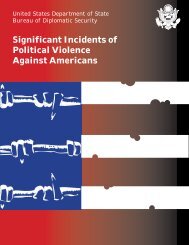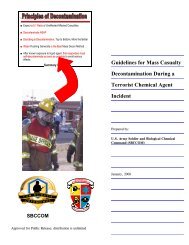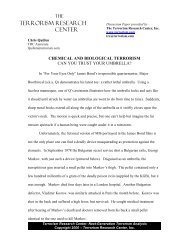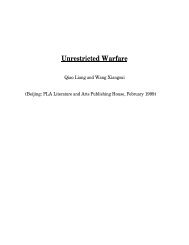Combating Proliferation of Weapons of Mass Destruction
Combating Proliferation of Weapons of Mass Destruction
Combating Proliferation of Weapons of Mass Destruction
Create successful ePaper yourself
Turn your PDF publications into a flip-book with our unique Google optimized e-Paper software.
The current Senior Director, as with his predecessor, was promoted from within, havingserved as a director in the <strong>of</strong>fice prior to the departure <strong>of</strong> his predecessor. The President’sNational Security Advisor makes the final determination on hiring Senior Directors.The process for selecting directors is informal. The Senior Director “announces” a vacancyto his proliferation colleagues in the departments and agencies. They, in turn, suggestpotential candidates to the Senior Director. The Senior Director interviews the candidatesand makes a recommendation to the Deputy National Security Advisor. The Deputyinterviews the Senior Director’s choice and, if he concurs, approves the recommendation.NSC budget limitations require that directors be reimbursable detailees, so the SeniorDirector recruits them from among career federal military and civilian pr<strong>of</strong>essionals. Thishas some advantages, as the positions require a detailed knowledge <strong>of</strong> the issues,agencies, and persons involved in proliferation-related policy, and the pace <strong>of</strong> work doesnot allow time for on-the-job training. Hence, career pr<strong>of</strong>essionals tend to make the best fit.The current Senior Director would like to have one additional director, preferably a ForeignService Officer with diplomatic negotiations experience, to handle regional proliferationmatters. He believes the addition <strong>of</strong> another director would free the Senior Director tomanage his staff more efficiently and assist more readily in crisis or urgent situations.The Senior Director for Non-<strong>Proliferation</strong> and Export Controls chairs the InteragencyWorking Group in his functional area. However, this responsibility will soon be transferredto the <strong>of</strong>fice <strong>of</strong> the new Under Secretary <strong>of</strong> State for Arms Control and InternationalSecurity/Special Advisor to the President for Arms Control, Non-<strong>Proliferation</strong> andDisarmament. The transfer is a product <strong>of</strong> the internal Administration negotiationsconcerning integration <strong>of</strong> the Arms Control and Disarmament Agency (ACDA) into theState Department. (See below.)The Senior Director, who also chairs the Highly Enriched Uranium (HEU) OversightCommittee, responsible for implementation <strong>of</strong> the U.S.-Russia HEU Agreement, expectsto continue to chair a biweekly meeting <strong>of</strong> Intelligence Community proliferation analysts,and department and agency proliferation specialists held via a secure videoteleconferencing system.Counselor for Defense Policy and Arms Control. In the Bush Administration,proliferation-related issues and export controls, plus defense policy and arms control, werethe province <strong>of</strong> a single senior director, who had one staff member to oversee proliferationrelatedand export controls issues. The latter functional area was assigned to a separatesenior director in the Clinton Administration, reflecting the higher priority accordedproliferation-related matters by the President. Some related issues, however, remainedwith the Senior Director for Defense Policy and Arms Control, recently renamed“Counselor.” These include Comprehensive Test Ban Treaty negotiations, U.S. nuclearposture, START treaty negotiations, ballistic missile defense policy, National and Theater5







